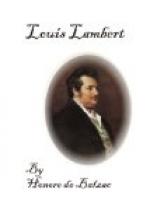“Do not be alarmed by the tears
that have wetted this page; they
are tears of joy. My only blessing,
we need never part again!”
In 1823 I traveled from Paris to Touraine by diligence. At Mer we took up a passenger for Blois. As the guard put him into that part of the coach where I had my seat, he said jestingly:
“You will not be crowded, Monsieur Lefebvre!”—I was, in fact, alone.
On hearing this name, and seeing a white-haired old man, who looked eighty at least, I naturally thought of Lambert’s uncle. After a few ingenious questions, I discovered that I was not mistaken. The good man had been looking after his vintage at Mer, and was returning to Blois. I then asked for some news of my old “chum.” At the first word, the old priest’s face, as grave and stern already as that of a soldier who has gone through many hardships, became more sad and dark; the lines on his forehead were slightly knit, he set his lips, and said, with a suspicious glance:
“Then you have never seen him since you left the College?”
“Indeed, I have not,” said I. “But we are equally to blame for our forgetfulness. Young men, as you know, lead such an adventurous and storm-tossed life when they leave their school-forms, that it is only by meeting that they can be sure of an enduring affection. However, a reminiscence of youth sometimes comes as a reminder, and it is impossible to forget entirely, especially when two lads have been such friends as we were. We went by the name of the Poet-and-Pythagoras.”
I told him my name; when he heard it, the worthy man grew gloomier than ever.
“Then you have not heard his story?” said he. “My poor nephew was to be married to the richest heiress in Blois; but the day before his wedding he went mad.”
“Lambert! Mad!” cried I in dismay. “But from what cause? He had the finest memory, the most strongly-constituted brain, the soundest judgment, I ever met with. Really a great genius—with too great a passion for mysticism perhaps; but the kindest heart in the world. Something most extraordinary must have happened?”
“I see you knew him well,” said the priest.
From Mer, till we reached Blois, we talked only of my poor friend, with long digressions, by which I learned the facts I have already related in the order of their interest. I confessed to his uncle the character of our studies and of his nephew’s predominant ideas; then the old man told me of the events that had come into Lambert’s life since our parting. From Monsieur Lefebvre’s account, Lambert had betrayed some symptoms of madness before




